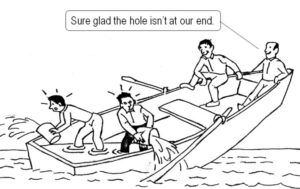Building Great Teams
Learning what it takes to build great teams
Introduction & Overview
 Welcome to this series on Building Great Teams.
Welcome to this series on Building Great Teams.
If you’re here, I’m assuming you’re interested in helping a group of people become a team. It’s also possible you already have a team, and you want to help them raise the bar, work through some conflict, or get past a rough stretch. Whatever your reason for being here, I look forward to sharing my team-building approach with you.
The ideas and insights in this seven-part series are foundational to my work in helping teams be great. I am sharing my approach with you to provide you with a framework for team building so that together, we can help more teams be awesome!
What is a team?
Imagine you’re in a row-boat with a group of people. Whether or not you’re a team is determined by how people behave and act towards each other.
 Is everyone rowing in the same direction and contributing their best efforts towards achieving a common goal? Or, is everyone doing what they think is right, despite not being aligned with each other.
Is everyone rowing in the same direction and contributing their best efforts towards achieving a common goal? Or, is everyone doing what they think is right, despite not being aligned with each other.
How do they respond to the water leaking in around someone’s feet? Are they pointing out that the other person has a problem? Or, are they collaborating and solving the problem together?
Groups act independently from each other, with each person doing what they think is best. Groups see problems as an individual’s responsibility and are slower to collaborate in resolving problems. This reality isn’t necessarily bad; rather, there is often no perceived benefit to joint responsibility for problems.
Teams, on the other hand, see themselves as being interdependent. Teams believe they’re dependent on each other and support each other’s contribution towards a common goal. When problems show themselves, teams will see it as their responsibility to work together to resolve them.
In looking at this definition of teams, the first question to ask yourself is whether you need or want one. There’s plenty of advantages to working as a team, but forming a team takes a commitment, and ability to commit to what it means to be a team.
If your answer is that you don’t need or want a team, then you may as well stop here. Trying to force a group to be a team when it’s not wanted or needed, often causes more problems than it fixes.
The good news is that forming a great team doesn’t require you to be a rocket scientist. Team building requires teams to have the conversations needed for any group of people to trust each other enough to start forming the bonds that will make them a team.
I’ve created this series as I want you to know that teamwork rarely happen by accident, and I want to share what’s worked for me as I’ve helped groups become teams.
If you’re ready, click the green button below and enter your best email address. Over the coming week, you’ll receive one email per day, building on the previous discussion. Through this you’ll learn key team building factors like:
- How trust is foundational to any great team
- Why aspirational purpose statements do little to build alignment
- How people who understand each other are more likely to trust each other
- How working agreements are more than a list of words
- How activating their leadership is essential to the continued growth of a team
I promise you there’s no sales pitch or obligation in signing up. You can unsubscribe anytime by clicking the link at the bottom of any email from me.
See you in your inbox!


